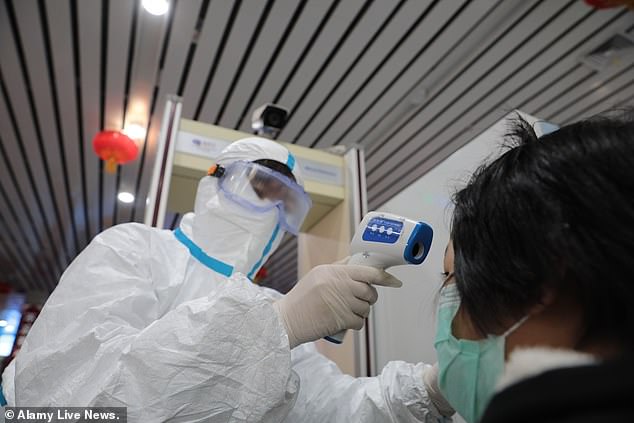Thousands of people in northwest China have tested positive for an infectious bacterial disease after a leak from a state-owned biopharmaceutical plant making animal vaccines.
Health officials in Lanzhou, a city of 2.9million, said 3,245 people had contracted brucellosis, a disease often caused by close contact with infected animals or animal products that can bring about fevers, joint pain and headaches.
Another 1,401 people tested as an early positive for the disease after the authorities screened nearly 22,000 residents. No death has been reported.
The Chinese officials also said there was no evidence of person-to-person transmission so far.
Brucellosis, also known as Malta fever or Mediterranean fever, can cause symptoms including headaches, muscle pain, fever and fatigue.
Some signs and symptoms may persist for longer periods of time while others may never go away or reoccur, such as arthritis or swelling in certain organs, according to the US Centers for Disease Control and Prevention (CDC).
Person-to-person transmission of brucellosis is ‘extremely rare’, said the CDC.
Chinese authorities found a biopharmaceutical plant had used expired disinfectant in its production of Brucella vaccines for animals between July and August last year – meaning the bacteria was not eradicated in its factory exhaust.
Contaminated gas from the China Animal Husbandry Lanzhou Biopharmaceutical Factory in Lanzhou formed aerosols containing the bacteria.
It was then carried by wind to the Lanzhou Veterinary Research Institute, infecting nearly 200 people there as of December last year.
More than 20 students and faculty members of Lanzhou University, some of whom had been to the institute, subsequently tested positive as well, according to Xinhua news agency.
Lanzhou’s health commission said Friday that sheep, cattle and pigs were most commonly involved in the spread of the bacteria.
The factory – which apologised earlier this year – has had its brucellosis vaccine production licence revoked, Lanzhou authorities said.
Compensation for patients would start in batches from October, according to local authorities.
The Lanzhou Health Commission also designated 11 public hospitals to provide the infected patients with free and regular checkups.
While brucellosis is not unknown in China, it has declined since the 1980s after the emergence of vaccines and better disease prevention and control.
It is extremely rare in the UK, according to the NHS, but there have been a smattering of brucellosis outbreaks around the world in the past few decades.
In 2008, an outbreak in Bosnia infected about 1,000 people, prompting the culling of sheep and other infected livestock.
What is brucellosis?
Despite being mostly eradicated in the UK, brucellosis is still a problem globally, and occurs in countries such as Greece, Spain and Italy.
It is the most common bacterial infection spread from animals to humans worldwide.
Brucellosis doesn’t always cause symptoms, and the infection may persist for several months without someone knowing they have it.
Humans usually become infected with brucellosis by consuming unpasteurised milk or milk products from infected animals, or very rarely, by eating raw meat from these animals.
However they can pick it up by inhaling dust or through direct contact with infected animals or surfaces.
Person-to-person spread is very rare, although there have been cases of transmission from mother to baby through breastfeeding, and through sexual contact.
Brucellosis is rarely fatal in humans, although some cases can lead to life-threatening complications such as endocarditis and meningitis – particularly if left untreated.


